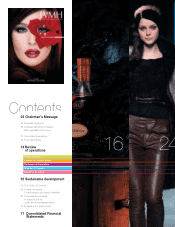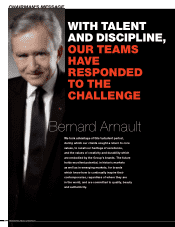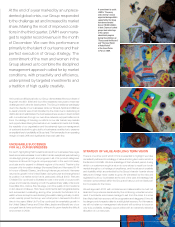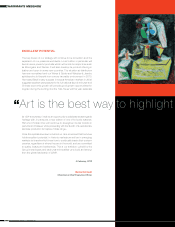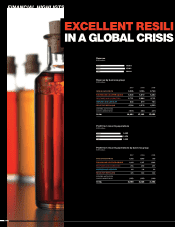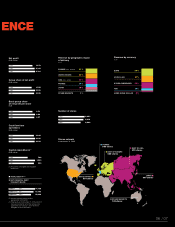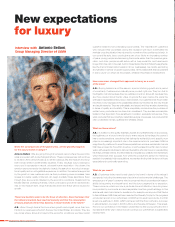Louis Vuitton 2009 Annual Report Download - page 10
Download and view the complete annual report
Please find page 10 of the 2009 Louis Vuitton annual report below. You can navigate through the pages in the report by either clicking on the pages listed below, or by using the keyword search tool below to find specific information within the annual report.
New expectations
for luxury
Given the consequences of the global crisis, are the growth prospects
for the luxury market in danger?
Antonio Belloni : We are going through a turbulent period where the economic
crisis is coupled with a psychological shock. These consequences will continue
to be felt in 2010, which impels us to remain cautious. But the medium and long-
term trends remain fundamentally excellent. Firstly, because luxury belongs to
every era. It represents a natural, universal human aspiration - the dream, the
emotion everyone needs, the desire for beauty, the search for a product of excep-
tional quality and an unforgettable experience. In addition, the market is supported
by the growth in new customers who, as their purchasing power increases, have
access to a better quality of life and can begin to satisfy those aspirations. Even
though they are currently affected by the economic conditions, Russia and the
Middle East are promising markets. China continues to grow at an extraordinary
rate. In the medium-term, large markets like India and Brazil will be vectors for
growth.
These new borders seem to be the focus of attention. Does that mean that
the historical markets have reached maturity and that the consumption
of luxury products will be less dynamic in those markets in the future?
A.B. : Even though Asia is the zone where growth is strongest, more than two-
thirds of our revenues come from Europe, the United States, and Japan. They are
key zones where, above and beyond the economic conditions, we have a solid
customer base and very interesting opportunities. The “aspirational” customers
who reduced their purchases during the recession will return to stimulate the
markets once the situation has returned to normal and the confidence is back. In
our current life style, luxury products are part of our life for an increasing number
of years: young people are discovering the brands earlier than the previous gene-
ration, and older people are still active, with a busy social life, and travel much
longer than they did in the past. Add to those factors the fact that some segments,
like the men's market (which exists in all our businesses), are rapidly expanding
and will offer a number of growth opportunities. I firmly believe that there is potential
in every country in which we are present, whatever the phase of development.
Have consumers changed their approach to luxury as a result
of the crisis?
A.B. : Buying behavior is not the same in a period of strong growth and a period
of uncertainty. Customers are naturally more prudent right now. They turn first to
the flagship brands because they are reliable icons and, above all, because they
are more careful about the fair value of goods. But even before the crisis the
changes in expectations about luxury were evident. Our customers are much better
informed, if only because of the possibilities offered by the Internet, the new media
and social networks. They are enthusiastic and expert, and they are also demanding
in terms of quality and durability. This is completely normal since the purchase of
certain luxury products can be close to an investment. They are also more sophis-
ticated in their approach, more sensitive to innovation, exclusivity and service. They
want products that are not simply ostentatious signs of success, but products that
offer undeniable intrinsic qualities and timeless values.
What are those values?
A.B. : In addition to the quality, aesthetic appeal and craftsmanship of its products,
the legitimacy of a luxury brand is due to many factors: its heritage, the power it
has to evoke emotions, everything that defines its authenticity and specific aura
plays an increasingly important role in the reasons behind a purchase. LVMH is
magnificently positioned to meet those expectations: we have emblematic brands
that have endured for more than a century, in some cases more than two hundred
years, with exceptional stories to tell; we have teams who fully focus on perpetuating
the magic of these brands, and the traditions of excellence, creativity and authenticity
which have built their success. And while the consumer's search for meaning
results in increasingly high expectations, we are also finding that the tenor of those
expectations is continually expanding.
What do you mean?
A.B. : Customers today need to feel close to the brand in terms of the values it
represents, including the awareness of social and environmental challenges. The
emergence of a "green" consumer who is concerned about corporate social respon-
sibility is becoming a universal trend, and the luxury segment is no exception.
These concerns, which are now a particular focus of attention, have long been
incorporated by our brands and are inseparable from their growth strategy. In this
area as well, each brand aims for excellence. For example, we are proud that thanks
to their initiatives LVMH has just been awarded the Diversity Trophy for the programs
conducted as part of our companies’ commitment to equal opportunity. And that
is just one example. In 2009, LVMH partnered with the Edun company, a pioneer
in ethical fashion, founded in 2005 by Bono and his wife Ali Hewson. This is testi-
mony to our confidence in the mission undertaken by this young company and it
represents another way in which we can continue our commitment to sustainable
development.
Interview with Antonio Belloni,
Group Managing Director of LVMH
PASSIONATE ABOUT CREATIVITY


